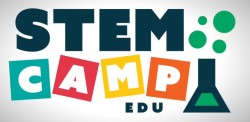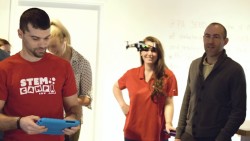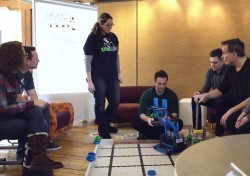Q&A with PD Campus: On STEM Camp EDU and Professional Development Experiences
July 11, 2018
on
on
 The PD Campus team comprises innovative educators who deliver professional development experiences to kindergarten to grade 12 (K-12) teachers looking to integrate STEM in their classes. The team includes Tom McGee (Founder and Director) and Lead Learners Ryne Anthony, Kirston Moore, Ken Ehrmann, Dylan Peters, Tom Guellich, Matt Rogers, and Linda Nitsche. We recently asked them about PD Campus, STEM Camp EDU, and the STEM movement.
The PD Campus team comprises innovative educators who deliver professional development experiences to kindergarten to grade 12 (K-12) teachers looking to integrate STEM in their classes. The team includes Tom McGee (Founder and Director) and Lead Learners Ryne Anthony, Kirston Moore, Ken Ehrmann, Dylan Peters, Tom Guellich, Matt Rogers, and Linda Nitsche. We recently asked them about PD Campus, STEM Camp EDU, and the STEM movement.C. J. Abate: Tell us about STEM Camp EDU. What is PD Campus?
PD Campus Team: STEM Camp EDU is an experience for K-12 Educators focus on the integration of STEM and STEAM Education. We provide attendees with high-level professional development differently than any other conference. They find themselves immersed in constant hands-on, high-energy activities. These activities include education-based escape rooms, design challenges, learning sessions, collaborative planning, and cardboard arcade building challenges. In addition to all the dynamic activities, attendees join a growing community of passionate educators. We dedicate lots of time to networking and growing our community. Educators leave STEM Camp EDU passionate, excited, and motivated to innovate education.

PD Campus is the company that brought STEM Camp EDU to life. PD Campus provides high-level professional development to educators in multiple facets. STEM Camp is one small piece to the puzzle. More exclusively, PD Campus facilities graduate level courses focused on 21st century teaching and learning. The courses include integrating iPads into education, infusing Google Education Suite into classrooms, and STEM education. The courses highlight strong pedagogical strategies for effective teaching. Some of the courses include devices for the teachers to truly learn best practices. Lastly, PD Campus provides personalized professional development to districts across the country. Recently, PD Campus assisted school districts in school openings where districts were launching 1:1 programs.
C. J.: What’s your business model?
PD Campus Team: The business model of PD Campus is simple: provide high-quality professional development experiences to educators. This business model is seen in the personalized professional development workshops, graduate courses, and STEM Camp EDU. We believe in inspiring educators to use best practices. The direction of the business is changing to push this model in all aspects of education.
C. J.: When was your first STEM Camp EDU event? How did it go? Who attended?
PD Campus Team: The first STEM Camp EDU event was July 2016. We had 35 passionate educators mostly from Pennsylvania. It was a huge success. Our educators were inspired to incorporate STEM into classrooms and help students engage in more authentic learning experiences.
C. J.: Let’s discuss the curriculum. What do STEM educators learn during the event? Perhaps you can tell us about what you cover on the first full day?
PD Campus Team: Educators learn about all aspects of STEM education. They are provided with ample opportunity to engage in each sphere and have the choice of which strands to dive deep. STEM Camp EDU has sessions including the following topics: Design Thinking, Creating Makerspaces, Electronics, 3-D Printing and Design, Engineering, Coding and Robotics. Most importantly, our sessions are not lecture-based how-tos. The sessions are small groups and all hands-on. We highlight the newest and most innovative products on the market, but most importantly how to incorporate into classrooms. Educators learn how to code robots, and how this activity fits into math classrooms K-12. They learn how to design video games and how those activities embed into creative writing. They design and 3-D print objects while also seeing how to incorporate inquiry-based learning into science and social studies.

C. J.: There is a growing interest among educators and parents on STEM education in the United States and Western Europe. What do you think is the driving force behind the movement? In the electronics engineering field, it’s likely due to the revolution in affordable, easy-to-use rapid-prototyping tools such as Arduino, Raspberry Pi, and 3-D printers. And the fact that everyone can learn and share ideas via social media.
PD Campus Team: We believe the STEM education movement is following industry and economy. Employers are seeking future employees that not only contain skills in electronics, coding, and engineering, but more importantly creative thinking. It’s this thinking process that PD Campus utilizes in STEM Camp and all of our graduate courses. We ask educators: “How can we utilize 21st-century skills and resources to encourage collaboration, creativity, critical thinking, and communication among our students?” This is at the core of effective STEM education.
C. J.: Tell us about the STEM educator field in the United States. I know that there have always been science and math teachers in the K-12 system. What about engineering instructors, particularly teachers focused on electronics, robotics, and coding? I don’t recall there being many teachers specialized in those areas when I was a child.
PD Campus Team: To be honest, higher education universities were not prepared for this movement. To our knowledge, these degrees and specializations do not exist yet. School districts are pushing the passionate and talented teachers to learn about these strands on their own. This is where STEM Camp EDU and PD Campus courses fit perfectly. We thrive on the opportunity to work with passionate educators eager to learn.
C. J.: Do school systems in the United States typically employ full-time electronics instructors? Can you get certified in electronics?
PD Campus Team: We do not have accurate enough information to answer this question. To our knowledge, in Pennsylvania, we do not know of this certification.
C. J.: Where do K-12 instructors in the United States learn about new technologies and products in STEM subject areas? For instance, how does the average high school teacher learn about new electronics tools, projects, and components?
PD Campus Team: The availability of these learning experiences is scarce. STEM Camp EDU has been and will continue to grow as the leading opportunity for educators to learn electronics and all STEM spheres. We hope to see our program grow and expand to reach all educators. This year, for the July 2018 event, we have educators from eight different states attending.
C. J.: When it comes to educating children, do you find it’s easier to interest them in engineering or math and sciences such as chemistry and biology?
PD Campus Team: We find it is easier to engage children in authentic and hands-on learning experiences. It takes the special design of a teacher to embed electronics into math or science subjects. We can successfully present students with hands-on, exciting, and rigorous learning experiences. These activities not only increase engagement, but also the amount of content taught. Through these dynamic learning experiences students learn more important skills including communication, collaboration, creativity, and critical thinking.
Read full article
Hide full article


Discussion (0 comments)